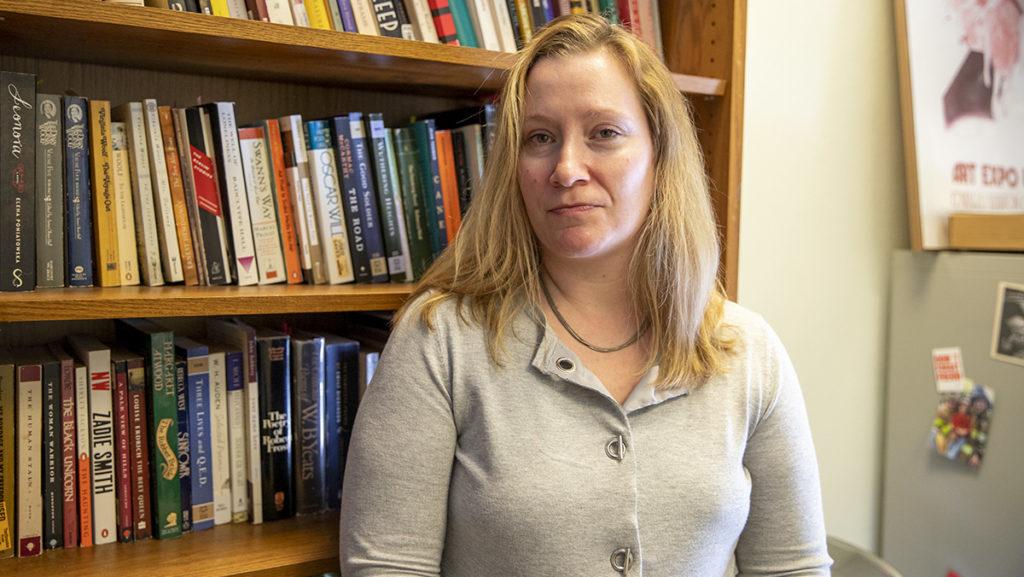Jennifer Spitzer, associate professor in the Department of Literatures in English, specializes in late 19th and 20th-century literature, modernist texts that originated in Europe and came to the U.S., and gender and sexuality, has written a book that will be released in February.
Her book, “Secret Sharers: The Intimate Rivalries of Modernism and Psychoanalysis,” highlights Sigmund Freud’s psychoanalytic thought through the lens of modernists and authors like Virginia Woolf and W.H. Auden who served as some of the first people to publish Freud’s psychoanalysis work in English.
Staff writer Vivian Rose spoke with Spitzer to discuss the process and experience of writing “Secret Sharers.”
This article has been edited for length and clarity.
Vivian Rose: What was your experience writing this book? How was it to get this book published?
Jennifer Spitzer: I would say it’s as much a product of my Ph.D. years as it is of my time as a teacher in the classroom, working with students and teaching classes in modernism, but also just having students … express interest in helping me research. I had one Ithaca College student who helped me with research. One Ithaca College student helped me with footnotes. Another Ithaca College student helped me with editing. So that has also been a major part of the process.
VR: What does this accomplishment mean to you?
JS: It feels like the conclusion of something that’s taken years and I very much am aware that it’s a collaborative effort as much as a single author is credited with the book. Not only have students helped me with research and editing, but I’ve had so many colleagues in the [college’s] Department of Literatures in English. Many colleagues and friends from other institutions read parts of it, edited it, and it really has felt like a community project. … And then of course it ended up differently than I had conceived of it when I was a doctoral student. So it’s exciting to see how the idea changed over time.
VR: How does this book connect to what you teach at Ithaca College?
JS: One of my chapters is on Virginia Woolf and how specifically she was both the first English language publisher of Freud but refused to read psychoanalysis until shortly before her death, and how she was quite threatened by it. … Part of my ongoing writing about Woolf inspired my 400-level Virginia Woolf seminar, which I’m teaching for the first time, and while that’s a bit more expansive in terms of its discussions of Woolf, in the class I talk with my students about how she was both interested in the new experiments … [and] how those new ideas about human psychology impacted her writing.
VR: What is your writing process?
JS: [My process was] a lot of haphazardly trying to slip in writing time between teaching courses and parenting, and I would say the single best habit I’ve developed in terms of writing has been to have writing groups — networks of other scholars and writers who hold each other accountable. I have a weekly writing group, kind of an accountability group. That really helps me set deadlines. I think with this book, especially in the last few years, having a number of different writing groups in which I both read other people’s writing and respond to theirs and have deadlines for my own, [has been] the most helpful practice I’ve established over the last few years because I write in fits and starts. I have no clear writing strategy when it comes to time of day or when I can during the weekends. I will write when I can in the evenings; however, I would say breaks and summers are the most productive for me in terms of writing. Because that can be so haphazard, for me, I would say writing groups and accountability groups have been the most useful practice I’ve developed.
VR: What do you hope people gain from reading your book?
JS: I’m interested in how literary modernism was in conversation with other movements, including psychoanalysis and … the efforts on the part of modernists to claim artistic autonomy that they were originating with experiments of their own. What’s also interesting is how these literary experiments in the first half of the 20th century came from freely associated writing and stream of consciousness prose, and how we’re heavily impacted by developments in psychology and psychoanalysis. The friction between these movements helped propel modernist experiments, which were an entangled set of movements of how authors were reading and not reading and publishing and practicing psychoanalysis themselves.
VR: Are you in the process of writing a second book? If so, what would the book focus on?
JS: My second book is an attempt to write a hybrid, scholarly and creative nonfiction [piece] that talks about grief in the time of pandemics. It does so by examining my own personal experience of loss during the pandemic through rereading Virginia Woolf, who wrote about loss during her own pandemic, the influenza pandemic of 1918. It’s thinking about grief in these two pandemics about 100 years apart.









